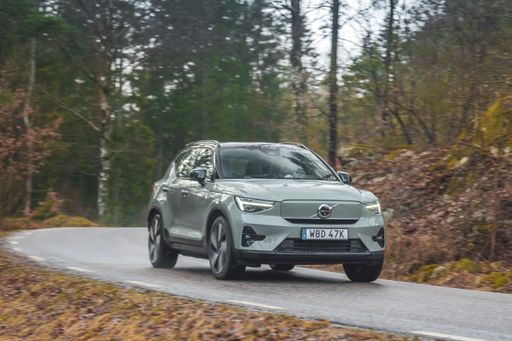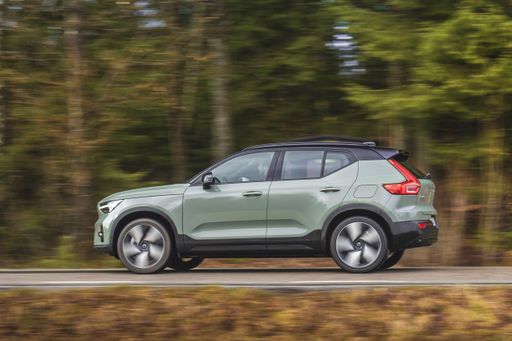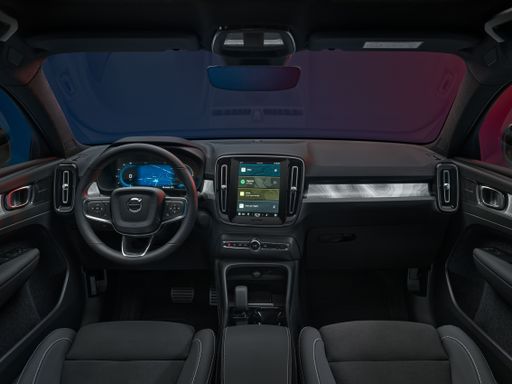Hyundai Tucson vs Volvo EX40 – Performance, range & efficiency compared
Two cars, one duel: Hyundai Tucson meets Volvo EX40.
Which one wins in performance, efficiency and value for money? Find out now!
Costs and Efficiency:
Price and efficiency are key factors when choosing a car – and this is often where the real differences emerge.
Hyundai Tucson has a noticeable advantage in terms of price – it starts at 30600 £, while the Volvo EX40 costs 42800 £. That’s a price difference of around 12214 £.
As for range, the Volvo EX40 performs convincingly better – achieving up to 576 km, about 506 km more than the Hyundai Tucson.
Engine and Performance:
Under the bonnet, it becomes clear which model is tuned for sportiness and which one takes the lead when you hit the accelerator.
When it comes to engine power, the Volvo EX40 has a clearly edge – offering 442 HP compared to 252 HP. That’s roughly 190 HP more horsepower.
In acceleration from 0 to 100 km/h, the Volvo EX40 is significantly quicker – completing the sprint in 4.60 s, while the Hyundai Tucson takes 7.90 s. That’s about 3.30 s faster.
In terms of top speed, the Hyundai Tucson performs barely noticeable better – reaching 194 km/h, while the Volvo EX40 tops out at 180 km/h. The difference is around 14 km/h.
There’s also a difference in torque: Volvo EX40 pulls convincingly stronger with 670 Nm compared to 367 Nm. That’s about 303 Nm difference.
Space and Everyday Use:
Whether family car or daily driver – which one offers more room, flexibility and comfort?
Both vehicles offer seating for 5 people.
In curb weight, Hyundai Tucson is distinct lighter – 1520 kg compared to 2040 kg. The difference is around 520 kg.
In terms of boot space, the Hyundai Tucson offers evident more room – 620 L compared to 410 L. That’s a difference of about 210 L.
In maximum load capacity, the Hyundai Tucson performs distinct better – up to 1799 L, which is about 399 L more than the Volvo EX40.
When it comes to payload, Hyundai Tucson to a small extent takes the win – 545 kg compared to 480 kg. That’s a difference of about 65 kg.
Who comes out on top?
Overall, the Volvo EX40 shows itself to be is largely superior and secures the title of DriveDuel Champion.
It convinces with the more balanced overall package and proves to be the more versatile choice for everyday use.

Volvo EX40
Hyundai Tucson
The Hyundai Tucson is a standout choice in the compact SUV segment, offering a perfect blend of style, comfort, and practicality. Its modern design is complemented by a spacious interior that provides ample room for passengers and luggage alike. With advanced technology and safety features, the Tucson ensures a smooth and enjoyable driving experience.
details @ hyundai.news
@ hyundai.news
 @ hyundai.news
@ hyundai.news
 @ hyundai.news
@ hyundai.news
 @ hyundai.news
@ hyundai.news
 @ hyundai.news
@ hyundai.news
Volvo EX40
The Volvo EX40 represents a new chapter in the brand's commitment to sustainability and innovation, combining elegant Scandinavian design with cutting-edge electric vehicle technology. With its spacious interior and intuitive technology, the EX40 provides a comfortable and connected driving experience. The focus on eco-friendly materials and efficient performance makes it an attractive choice for those seeking a responsible and stylish drive.
details @ media.volvocars.com
@ media.volvocars.com
 @ media.volvocars.com
@ media.volvocars.com
 @ media.volvocars.com
@ media.volvocars.com

|

|
|
|
|
Costs and Consumption |
|
|---|---|
|
Price
30600 - 46300 £
|
Price
42800 - 58200 £
|
|
Consumption L/100km
1 - 6.9 L
|
Consumption L/100km
-
|
|
Consumption kWh/100km
-
|
Consumption kWh/100km
16.6 - 17.6 kWh
|
|
Electric Range
64 - 70 km
|
Electric Range
480 - 576 km
|
|
Battery Capacity
-
|
Battery Capacity
67 - 79 kWh
|
|
co2
22 - 156 g/km
|
co2
0 g/km
|
|
Fuel tank capacity
42 - 54 L
|
Fuel tank capacity
-
|
Dimensions and Body |
|
|---|---|
|
Body Type
SUV
|
Body Type
SUV
|
|
Seats
5
|
Seats
5
|
|
Doors
5
|
Doors
5
|
|
Curb weight
1520 - 1889 kg
|
Curb weight
2040 - 2170 kg
|
|
Trunk capacity
546 - 620 L
|
Trunk capacity
410 L
|
|
Length
4510 - 4520 mm
|
Length
4440 mm
|
|
Width
1865 mm
|
Width
1863 mm
|
|
Height
1650 mm
|
Height
1647 mm
|
|
Max trunk capacity
1721 - 1799 L
|
Max trunk capacity
1286 - 1400 L
|
|
Payload
525 - 545 kg
|
Payload
430 - 480 kg
|
Engine and Performance |
|
|---|---|
|
Engine Type
Diesel MHEV, Petrol MHEV, Petrol, Full Hybrid, Plugin Hybrid
|
Engine Type
Electric
|
|
Transmission
Automatic, Manuel
|
Transmission
Automatic
|
|
Transmission Detail
Dual-Clutch Automatic, Manual Gearbox, Automatic Gearbox
|
Transmission Detail
Reduction Gearbox
|
|
Drive Type
Front-Wheel Drive, All-Wheel Drive
|
Drive Type
Rear-Wheel Drive, All-Wheel Drive
|
|
Power HP
136 - 252 HP
|
Power HP
238 - 442 HP
|
|
Acceleration 0-100km/h
7.9 - 11.6 s
|
Acceleration 0-100km/h
4.6 - 7.3 s
|
|
Max Speed
180 - 194 km/h
|
Max Speed
180 km/h
|
|
Torque
265 - 367 Nm
|
Torque
420 - 670 Nm
|
|
Number of Cylinders
4
|
Number of Cylinders
-
|
|
Power kW
100 - 185 kW
|
Power kW
175 - 325 kW
|
|
Engine capacity
1598 cm3
|
Engine capacity
-
|
General |
|
|---|---|
|
Model Year
2024
|
Model Year
2024
|
|
CO2 Efficiency Class
E, F, D, B
|
CO2 Efficiency Class
A
|
|
Brand
Hyundai
|
Brand
Volvo
|
What drive types are available for the Hyundai Tucson?
Available configurations include Front-Wheel Drive or All-Wheel Drive.
The prices and data displayed are estimates based on German list prices and may vary by country. This information is not legally binding.
